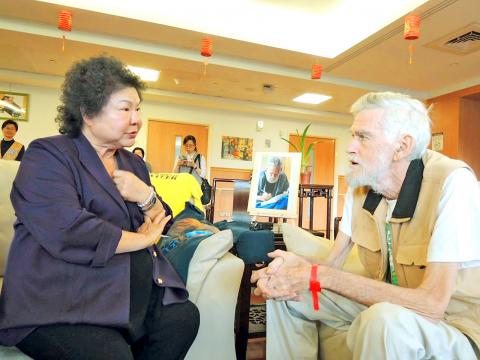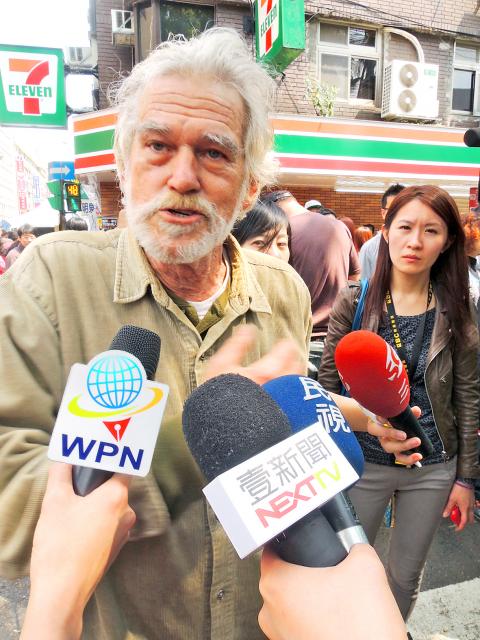Human rights and social activist Lynn Miles, a well-known fighter for Taiwanese democracy, died early yesterday morning at a hospice in New Taipei City.
The 72-year-old American, also known by his Chinese name Mei Hsin-yi (梅心怡), had been suffering from mesothelioma, a cancer linked to asbestos that attacks the membrane lining of the lungs and abdomen, for several months, and spent the past few weeks at the Tzu Chi General Hospital in Xindian District (新店). He died at 1:30am.
Miles first came to Taiwan in 1962 to study Chinese. He became friends with people such as National Taiwan University professor Peng Ming-min (彭明敏) and writer Li Ao (李敖), and in 1967, he and a German friend, Klaus-Peter Metzke, opened The Barbarian (野人咖啡室) cafe in Ximending, where people could meet and exchange ideas.

Photo: Liu Li-jen, Taipei Times
He helped Peng, who, along with two of his students, had been convicted for publishing a manifesto calling for the overthrow of the Chiang Kai-shek (蔣介石) regime, escape house arrest and flee the nation for exile in Sweden in 1970.
The Chiang government deported Miles the following year, after he tried to help Li and Peng’s two students after they were arrested. The government blacklisted him from returning to Taiwan until 1996.
Miles moved to Osaka, Japan, where he continued his pro-democracy efforts for Taiwan, establishing the International Committee for the Defense of Human Rights in Taiwan. The committee helped smuggle information about political prisoners out of Taiwan and Miles wrote reports on the political situation and the prisoners, and provided them to Amnesty International and other rights groups, reporters and churches.

Photo: Hsieh Wen-hua, Taipei Times
He spent several years in the US before returning to Taiwan once the blacklist was lifted.
He received permanent residency in Taiwan in 2006 for his “special contributions to the nation” and in recent years taught at Fu Jen Catholic University.
The New Jersey native continued to be a familiar face at protests over rights issues and spoke out on a variety of issues, including efforts to end the death penalty in Taiwan, and organizing several Peacefests. He burned his US passport in front of the American Institute in Taiwan in Taipei on March 23, 2003, to protest the US-led war in Iraq.
He coauthored with Linda Gail Arrigo a book about the human rights movement in Taiwan, A Borrowed Voice: Taiwan Human Rights through International Networks, 1960-1980, which was published in 2008.
In February, Miles was among 119 people indicted by Taipei prosecutors for taking part in Sunflower movement-linked rallies in Taipei in the spring of last year against the government’s handling of a cross-strait service trade agreement.
As Miles’ health worsened in recent weeks, several prominent Democratic Progressive Party (DPP) members visited him at the hospital, including DPP Chairperson Tsai Ing-wen (蔡英文) and Kaohsiung Mayor Chen Chu (陳菊), while a Peacefest to celebrate his life was held on May 30.
Tsai, who is currently on a trip to the US, mourned Miles’ death.
“Leaning about his passing away is a very saddening thing,” Tsai said in a statement on her official Facebook page. “As an American, he has always been a good friend of Taiwan, who long assisted Taiwan in democratization, and sincerely hopes that the Taiwanese people could live in freedom and democracy.”
She called Miles a witness of a time.
“From undemocratic to democratic, it is because of many friends like him who took actions to support us that Taiwan is able to become democratized in the end,” Tsai said. “May he rest in peace, and may he be free of all pains.”
Additional reporting by Loa Iok-sin

CHAOS: Iranians took to the streets playing celebratory music after reports of Khamenei’s death on Saturday, while mourners also gathered in Tehran yesterday Iranian Supreme Leader Ayatollah Ali Khamenei was killed in a major attack on Iran launched by Israel and the US, throwing the future of the Islamic republic into doubt and raising the risk of regional instability. Iranian state television and the state-run IRNA news agency announced the 86-year-old’s death early yesterday. US President Donald Trump said it gave Iranians their “greatest chance” to “take back” their country. The announcements came after a joint US and Israeli aerial bombardment that targeted Iranian military and governmental sites. Trump said the “heavy and pinpoint bombing” would continue through the week or as long

TRUST: The KMT said it respected the US’ timing and considerations, and hoped it would continue to honor its commitments to helping Taiwan bolster its defenses and deterrence US President Donald Trump is delaying a multibillion-dollar arms sale to Taiwan to ensure his visit to Beijing is successful, a New York Times report said. The weapons sales package has stalled in the US Department of State, the report said, citing US officials it did not identify. The White House has told agencies not to push forward ahead of Trump’s meeting with Chinese President Xi Jinping (習近平), it said. The two last month held a phone call to discuss trade and geopolitical flashpoints ahead of the summit. Xi raised the Taiwan issue and urged the US to handle arms sales to

State-run CPC Corp, Taiwan (CPC, 台灣中油) yesterday said that it had confirmed on Saturday night with its liquefied natural gas (LNG) and crude oil suppliers that shipments are proceeding as scheduled and that domestic supplies remain unaffected. The CPC yesterday announced the gasoline and diesel prices will rise by NT$0.2 and NT$0.4 per liter, respectively, starting Monday, citing Middle East tensions and blizzards in the eastern United States. CPC also iterated it has been reducing the proportion of crude oil imports from the Middle East and diversifying its supply sources in the past few years in response to geopolitical risks, expanding

Pro-democracy media tycoon Jimmy Lai’s (黎智英) fraud conviction and prison sentence were yesterday overturned by a Hong Kong court, in a surprise legal decision that comes soon after Lai was jailed for 20 years on a separate national security charge. Judges Jeremy Poon (潘兆初), Anthea Pang (彭寶琴) and Derek Pang (彭偉昌) said in the judgement that they allowed the appeal from Lai, and another defendant in the case, to proceed, as a lower court judge had “erred.” “The Court of Appeal gave them leave to appeal against their conviction, allowed their appeals, quashed the convictions and set aside the sentences,” the judges